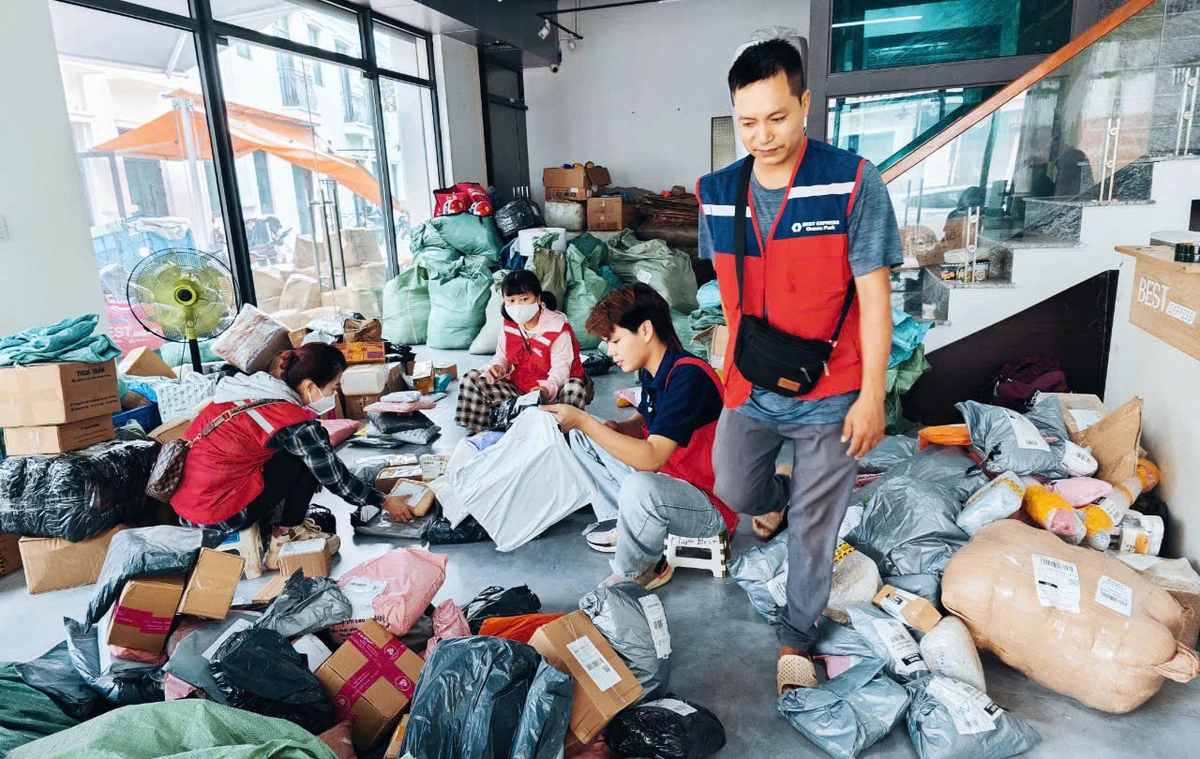A high volume of low-cost goods is inundating the Vietnamese market via e-commerce platforms. With unclear origins, it is raising concerns over the increasing waste volume and environmental impact.
A report by e-commerce market research platform Metric showed that Vietnam’s e-commerce growth outpaced the local economic growth.
In January-September this year, revenue of e-commerce platforms in Vietnam surged 37.66 percent year on year.
In the third quarter of 2024, Vietnamese shoppers spent VND84.75 trillion (US$3.3 billion) online, an 18.2-percent quarter-on-quarter increase.
This increase has resulted in a high volume of waste in Vietnam, posing a risk to the environment.
Nguyen Ngoc Hien from the Vietnam Eco-Friendly Products Manufacturer Association voiced his surprise at the low costs of Chinese products on the e-commerce platform Temu.
“I bought a hat at only VND70,000 (US$2.8), while the price ranges between VND120,000 ($4.7) and VND250,000 ($9.9) on other channels.
"A VND300,000 ($11.9) pair of shoes on Temu costs up to VND600,000 ($23.7) in Vietnam,” Hien noted.
Other platforms like Shopee, TikTok, and Shein also offer low-cost Chinese products, but Temu boosts sales using multi-level selling methods, such as 30-percent commissions for those successfully inviting others to buy products on Temu and VND150,000 ($5.9) for each friend they invite to download the Temu app.
Because of these policies, many people in Vietnam have joined groups to buy products on Temu, hoping to enjoy a group discount.
As a result, the plastic waste volume from Temu may be higher than that created by other e-commerce platforms.
"Without prompt solutions, Vietnam faces a risk of becoming a landfill," Hien added.
According to another expert in e-commerce, low-cost products on e-commerce platforms tend to have poor quality, increasing the risk that they would be gotten rid of.
Phone cases, water jugs, footwear, and fashion items, are the best-selling products on e-commerce platforms and need hundreds of years to decompose.
Pham Van Viet, vice chairman of the Ho Chi Minh City Textile and Garment - Embroidery Association, said cheap fashion products with unclear origins may not only cause environmental pollution but also harm consumers’ health as they may cause allergies and rashes.
He warned that "poor-quality products do not make users feel comfortable and are often thrown away after a short period of use, placing a burden on the environment."
Threatening environment
The report “Plastic Packaging Waste from E-Commerce in Vietnam” by the World Wildlife Fund showed that e-commerce platforms in Vietnam consumed some 332,000 metric tons of packaging products in 2023, including 171,000 metric tons of plastic packaging products.
Most of them were not recycled but discharged into the environment.
According to Metric, fashion always tops the products with the highest revenue on e-commerce platforms, especially products priced at VND100,000-200,000 ($4-8) each.
These products are attractive to consumers due to low costs and diversity but have a short lifespan for the same reason and quickly become waste.
Over the past seven years, Vietnam’s e-commerce has maintained a growth rate of 16-30 percent annually.
If the e-commerce sector maintains its double-digit growth, the sector’s scale will increase 4.7 times by 2030, and the waste volume will reach 800,000 metric tons per year, according to the Vietnam E-Commerce Association.
Cardboard boxes, paper bags, plastic bags, plastic tapes, and plastic wrap, are used to package products, leaving a great impact on the environment, an expert from the association said.
Furthermore, most e-commerce activities are in large and coastal cities, including Ho Chi Minh City, Hanoi, Hai Phong, and Da Nang, which boast rivers and beaches, so they face a high risk of water pollution.
Pham Van Viet from the Ho Chi Minh City Textile and Garment - Embroidery Association said low-cost fashion items are a main source of waste, noting that fashion items have become industrial waste and most are burned or buried when discarded.
Do Hoa, the founder of IME Vietnam Co. Ltd., said China considers Vietnam as a consumption market for its inventories or even defective products.
Sending goods to neighboring countries helps China reduce the costs of destroying goods that are of poor quality and fail to meet its criteria.
If the situation continues, Vietnam will likely scale down production and experience a higher unemployment rate and economic downturn.
Effective solutions needed
The Vietnamese government’s intervention is required to ensure a fair business environment. Local authorities should issue policies to tighten control over imports, including those from China.
In particular, the government needs to ensure that imports meet quality standards like locally-made products, and Vietnam should establish specific criteria and taxes; plus take technical measures to minimize poor-quality products and protect domestic consumers and enterprises.
Another reason for the popularity of Chinese goods is the low delivery costs, many orders even cost less to deliver from China than from Hanoi.
The founder of IME Vietnam said, "The high delivery costs hinder Vietnamese enterprises' competitiveness."
Battling against poor logistic infrastructure and management prohibits local firms from offering competitive pricing, losing market shares.
Meanwhile, Chinese enterprises receive great support from their government, including tax reductions, financial support, and export preferential policies.
According to Nguyen Xuan Hung, a representative of the Vietnam Logistics Business Association, it is important to adapt to and take advantage of the development of logistics systems and e-commerce, instead of focusing only on responding to the influx of Chinese goods.
Vietnamese enterprises should improve the quality of their products, optimize production and distribution, and employ flexible and creative marketing strategies and artificial intelligence to access customers.
Without prompt solutions, Hung warned that Vietnamese firms will lose to Chinese rivals in their own market.
Like us on Facebook or follow us on Twitter to get the latest news about Vietnam!



















































